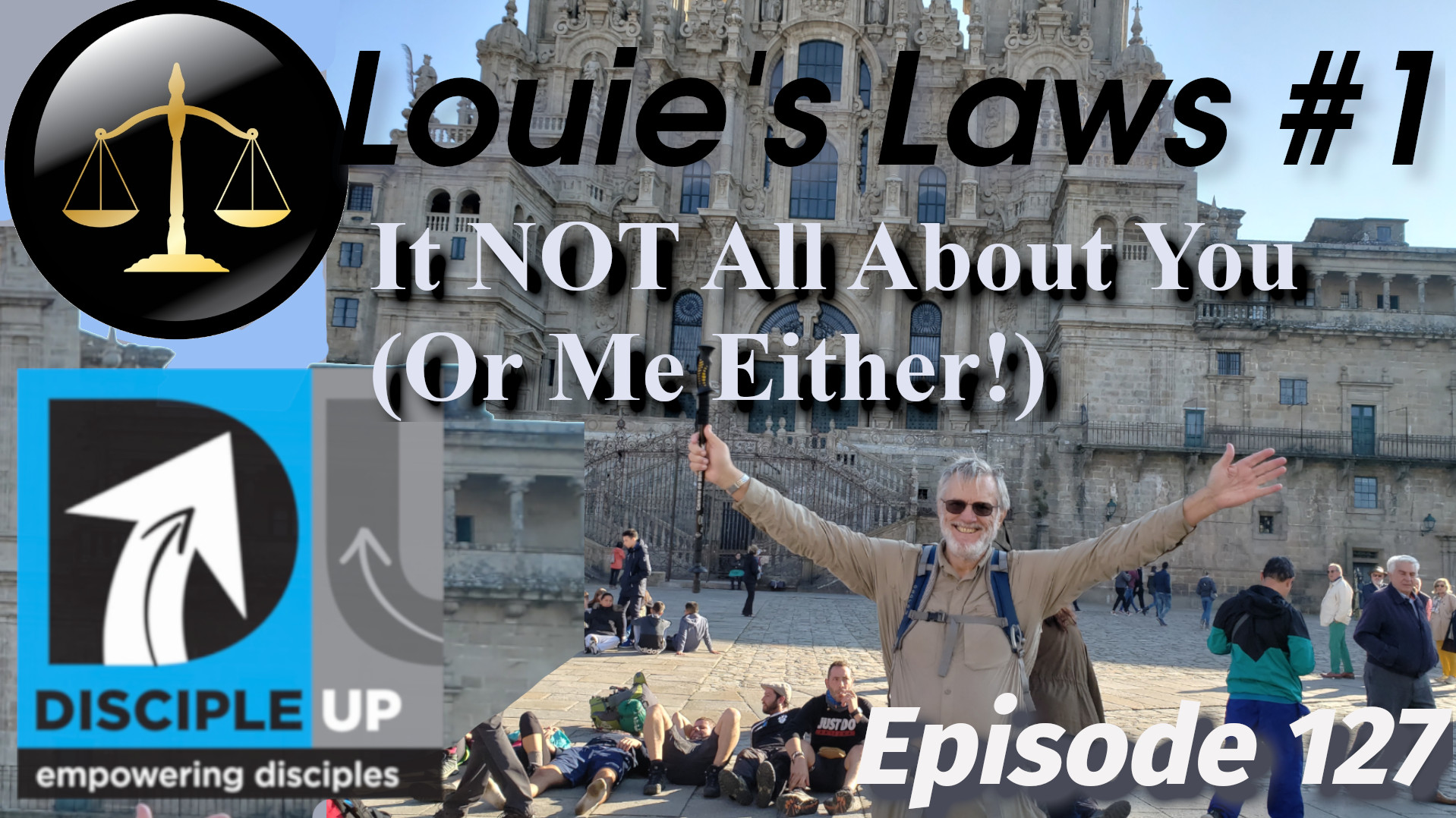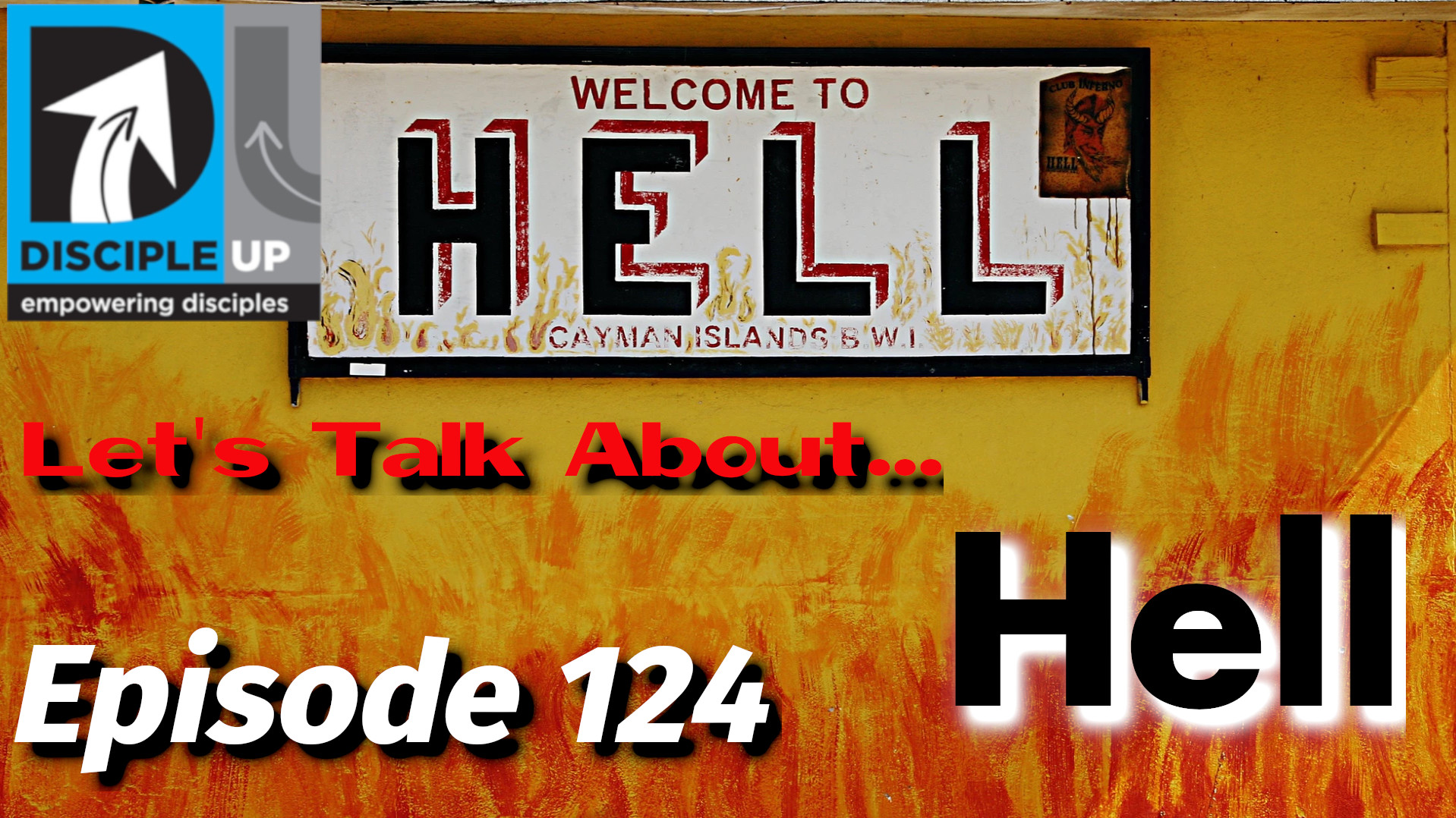Disciple Up #127
Louie’s Law #1, Nothing Is All About You (Or Me Either!)
By Louie Marsh, 9-25-2019
Live Stream on YouTube for International Podcast Day is coming up in 5 days!
Link to YouTube: shorturl.at/inMX3
Louie’s Laws – things I believe are important that are supported by Scripture but perhaps not explicitly stated there. Either that or just ideas that are so important I believe they need to be stated and restated.
Rick Warren started his best selling book the Purpose Driven Life with this statement, “It’s not about you.” To date he’s sold about 32 million copies in 58 languages, so he just might have something here. I’m amending it slightly and it’s the first Louie’s Law that I’ll be doing.
Law One: Nothing is all about you (or me either!).
Life isn’t about me, the church isn’t about me, right and wrong aren’t about me, even happiness isn’t about me! All these, and a whole lot more – are about God! Even I shouldn’t be about me, it’s all about Jesus first, others second and them me, maybe.
23 Then he said to them all: “If anyone would come after me, he must deny himself and take up his cross daily and follow me. 24 For whoever wants to save his life will lose it, but whoever loses his life for me will save it. Luke 9:23-24 (NIV)
23 And he said to all, “If anyone would come after me, let him deny himself and take up his cross daily and follow me. 24 For whoever would save his life will lose it, but whoever loses his life for my sake will save it. 25 For what does it profit a man if he gains the whole world and loses or forfeits himself? Luke 9:23-25 (ESV)
What this means: This doesn’t mean you don’t take care of yourself as if often said. Only a foolish person let’s themselves get run down because that’s not good for you or for your ability to serve God and others. All these “Laws” must be applied wisely!
16 Do you not know that you are God’s temple and that God’s Spirit dwells in you? 17 If anyone destroys God’s temple, God will destroy him. For God’s temple is holy, and you are that temple. 1 Corinthians 3:16-17 (ESV)
18 Flee from sexual immorality. Every other sin a person commits is outside the body, but the sexually immoral person sins against his own body. 19 Or do you not know that your body is a temple of the Holy Spirit within you, whom you have from God? You are not your own, 20 for you were bought with a price. So glorify God in your body. 1 Corinthians 6:18-20 (ESV)
Being a servant is saying I’m putting others first. That doesn’t mean they are better than I am or that I’m not important. They are a greater priority they are not better than I am. This is not a statement of inferiority.
28 You heard me say to you, ‘I am going away, and I will come to you.’ If you loved me, you would have rejoiced, because I am going to the Father, for the Father is greater than I. John 14:28 (ESV)
5 Have this mind among yourselves, which is yours in Christ Jesus, 6 who, though he was in the form of God, did not count equality with God a thing to be grasped, 7 but emptied himself, by taking the form of a servant, being born in the likeness of men. 8 And being found in human form, he humbled himself by becoming obedient to the point of death, even death on a cross. 9 Therefore God has highly exalted him and bestowed on him the name that is above every name, 10 so that at the name of Jesus every knee should bow, in heaven and on earth and under the earth, 11 and every tongue confess that Jesus Christ is Lord, to the glory of God the Father. Philippians 2:5-11 (ESV)
Biblical servanthood is sacrificing now for later, time for eternity. It’s not being a door mat, it’s choosing to sacrifice for the Gospel of God.
OBSERVATIONS:
It’s my life – how can it NOT be all about me?
7 For none of us lives to himself, and none of us dies to himself. 8 For if we live, we live to the Lord, and if we die, we die to the Lord. So then, whether we live or whether we die, we are the Lord’s. 9 For to this end Christ died and lived again, that he might be Lord both of the dead and of the living. Romans 14:7-9 (ESV)
THE WORD “ALL” IS IMPORTANT:
I’m not saying or implying you have no value, obviously to God you are of infinite worth.
32 This mystery is profound, and I am saying that it refers to Christ and the church. Ephesians 5:32 (ESV)
25 Husbands, love your wives, as Christ loved the church and gave himself up for her, 26 that he might sanctify her, having cleansed her by the washing of water with the word, 27 so that he might present the church to himself in splendor, without spot or wrinkle or any such thing, that she might be holy and without blemish. Ephesians 5:25-27 (ESV)
God values you greatly because He created you and Jesus died for you.
10 For we are his workmanship, created in Christ Jesus for good works, which God prepared beforehand, that we should walk in them. Ephesians 2:10 (ESV)
But that doesn’t mean I have any intrinsic value. I’m like one of the old comic books I own. In and of themselves they are worthless. Old and printed on low quality paper. But because people want them then they have value and their values goes up and down depending on how much people want them.
My intrinsic value is very little – 6 All of us have become like one who is unclean, and all our righteous acts are like filthy rags; we all shrivel up like a leaf, and like the wind our sins sweep us away. Isaiah 64:6 (NIV)
(Gingerbread Man illustration thanks to Chuck Smith.)
But because God loves us and Jesus died for us THEN we become of infinite worth to God, not necessarily anyone else.
16 “For God so loved the world, that he gave his only Son, that whoever believes in him should not perish but have eternal life. 17 For God did not send his Son into the world to condemn the world, but in order that the world might be saved through him. John 3:16-17 (ESV)
This takes us right back to the Gospel.
Please Get In Touch!
Email – louie@discipleup.org

Check out the Disciple Up Facebook page:
My books –













